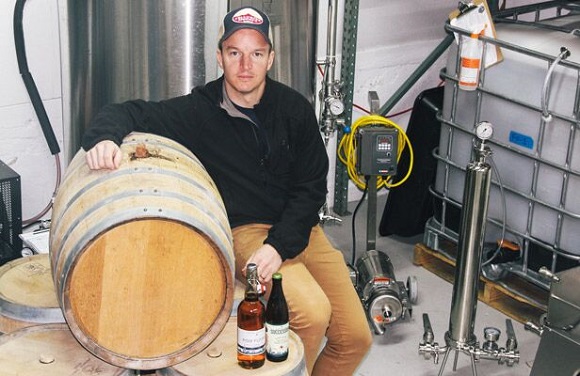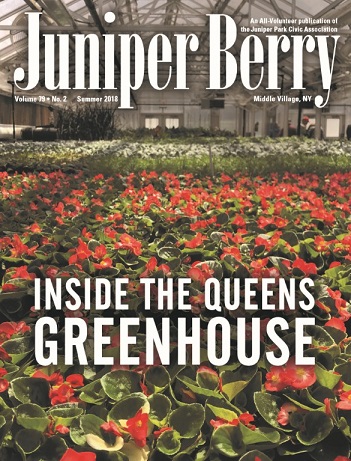Hard cider was a very popular drink in colonial times, as water in many areas was not always safe to drink. Interest in it declined after Prohibition, but in recent years, demand for hard cider has been on the rise. New York, the second largest apple growing region in the country, produces a wide range of excellent apple varieties that are perfect for cider. Descendant Cider Company was founded in 2014 on Flushing Avenue as the city’s first cidery and uses NYS apples exclusively. Here we present a Q&A with Jahil Maplestone, the company’s co-founder.
Q: What brought you to New York City and why Maspeth in particular?
The company’s owners (myself and my wife, Alexandria Fisk) are both expats from Australia and the UK respectively. We were working in completely unrelated fields in NYC when we decided to start a cider company here in the 5 boroughs. We wanted a small, affordable production space for the initial phase of the business and we found an economically suitable, very small space in Maspeth for us to begin our company and figure out how to make this all possible.
Q: What is the meaning of the name “Descendant”?
The name has a double meaning. Apples don't grow true to seed, meaning if you plant a golden delicious apple seed you'll get an entirely new variety of apple. Almost every apple is made by grafting a branch of the original tree so almost every apple variety is a direct descendant of the original tree.
It's also in reference to the cider culture in America. It's a descendant of this once great cider culture, drawing on the traditions but it's a new generation going in its own direction.
Q: You have a real passion for cider. What led you to start?
I started making cider as an extension of wine making and beer brewing which have been hobbies of mine for over 20 years and included some time working in the wine industry in Australia. Since moving to NY with access to such incredible orchards, cider became really interesting to me and developed into the business we have today.
Q: Which apples are the best to make cider with and why? Do you source your apples locally?
Apples with good acid and tannin components are best for cider. After the sugar is fermented away the remaining acids and tannins are what give the cider it's complexity. Apples ranging from dessert variety apples such as Empires, Macs and Ida Red to name but a few, with high acid content are suitable for some ciders. Specific cider variety apples with very bitter, astringent qualities as well as complex acids that are sometimes quite unpleasant to eat are what most cidermakers want. These are mostly unknown varieties like Dabinett, Chisel Jersey, and Nehou hailing from traditional cider regions of England, France and Spain.
We try to source all our apples that we don't grow ourselves as locally as possible to Queens. This is why the majority of what we use comes from the Hudson Valley.
Q: How many people do you employ?
We currently have 2 employees in addition to the 2 owners and use some extra part time help during the busy times of year as well.
Q: How many bottles do you produce a year?
We make approximately 10,000 gallons a year in varying formats and sizes including kegged cider for draft accounts, so a bottle count is hard to calculate, but that would be approximately 50,000 bottles if it we're all in champagne bottles.
Q: What are your current products?
We have about 6 consistently made ciders available but we have a large and constantly evolving list of different ciders being made in addition to those. Being an agricultural product, the seasons dictate what fruit and what quality is available and we adjust our range accordingly. Those six are:
Succession Semi Dry: A blend of 6 apple varieties fermented to dryness and then sweetened with a blend of fresh pressed apple juice to balance the acidity.
Pomme Rosé: A delicious blend of apples, pomegranate and hibiscus flowers. It's crisp, tart and refreshing. The pomegranate is used purely to balance the cider whilst not adding an overpowering fruit cider character.
Dry Hopped: A crisp, dry cider, generously dry hopped with Citra, Cascade and Crystal hops. Aromas of tropical and stone fruits, pine and spice. A truly crushable, clean, dry cider.
Origin Ginger and Cardamom: Heirloom cider apples blended with ginger and steeped with cardamom pods. Spicy ginger compliment the semi dry cider followed with aromatic cardamom.
Descendant Dry: Has strong ripe apple aromas and bright acidity balanced with bittersweet tannin. It is medium body and bone dry. It also has bright appearance as a result of the aging process.
Wilderness Wild Foraged Cider: A blend of wild seedling apple trees and long forgotten orchards that have been overlooked for decades. Over sixty unique apple trees are in this true representation of an historic apple growing region between the Southern Catskills and the Delaware river. Complex acidity with mild tannins and aromas of stone fruit. This dry cider has a brilliant pale gold appearance.
English Kills: A traditional English cider consisting of a blend of vintage English cider apples fermented long and slow over four months then aged for another six months. Rich tannins and ripe fruit aromas combine in this traditional approach to English cider making. A rich golden appearance this cider is completely unfiltered or clarified in anyway.
Q: What's your favorite part of making cider?
The science, the engineering, growing apples it's all great, and drinking it isn't half bad either!
Q: Where can people find your cider?
We're currently available in Queens, Brooklyn and Manhattan with some distribution in New Jersey as well. Where ever you find good, independent craft beer you'll find us as well.
Q: What are your plans for the future?
We are working on a new project in Sullivan County where our orchard is and are planning an expansion here in the city to enable us to make more cider and welcome the public to see our process.



